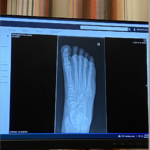I talk about how to manage stress and promote mental health and emotional wellness through assessing balance in the key areas of your life that promote a healthy mind and body.
Hello, everybody, my name is Dr. Talia Marcheggiani. I’m a mental health and hormone expert.
Stress is a big reason why a lot of people come to see me, for support in their lifestyle and optimization of their health, especially their mood and mental health.
And, one of the things that I’ve come to understand in working with people one on one is that stress in life is an inevitability, especially in our society.
Work is just one aspect of the stress that influences our lives, but things like loss of loved ones, and ending of relationships, pressure from work, monetary struggles. These things in society are inevitabilities. So, we’re sooner or later going to be faced with major stressors in our lives regardless of how well our life is happening right now.
One of the big things in terms of working with people is helping with their resilience to stress. That means building up resources. So, before I meet with a patient I have them fill out an online intake form. And this is sent to their email and one of the—the intake form goes over what their concerns are, what they’re coming in for, it goes through all the areas of their health, their physical health and mental health and one aspect as well, in the chart is something called The Wheel of Balance. And, what the Wheel of Balance does is, it looks at all the major pillars that make up somebody’s life. It asks the potential patient or the new patient, to assess, to rate on a scale of 1 to 10 how satisfied they are with that area of their life.
So, for example, one of the areas is health and so on a scale of 1 to 10 how you feel that your health is managed? How satisfied are you with your level of health? Are you in chronic pain? Do you feel unwell generally? Or do you feel like health is pretty well managed, despite the fact that you’re coming in with a health concern?
Another area is relationships. So, personal relationships. So, some people don’t have a significant other and, if that’s so, how do you feel about that? Or, if you do have a significant other, how satisfying is that relationship? How well do you feel that relationship supports you in your life?
There’s several reasons for this Wheel of Balance. One is to just get a general understanding of the life of the person I’m going to be working with, what the broad picture is in terms of their life.
And another reason is that we know a lot of these factors such as relationships, and health and career, and money and whether you have hobbies, whether you have something that fills you, something that gives you a sense of purpose, we know that these things are determinants of health. So, your socioeconomic status is one of these factors that determines your longevity or your resilience against disease, especially your resilience against stress. If I have somebody coming in with depression and anxiety who’s recently been laid off, no amount of herbs—well, the herbs can buffer the stress response and relax the physical body so that somebody can look for work, but on the high priority list is helping them find a job again, because no matter how calm you’re feeling physically, or much meditation you’re doing, the fact that you don’t have a way to pay your bills is a major stressor that won’t go away until it’s dealt with.
And, another reason as well for doing this Wheel of Balance, if we’re assessing this holistic scope of what someone’s life is, is the fact that these pillars, when they’re strengthened, they provide the basis for the resilience against onslaughts of stress that come in.
So, many of the people that come in and see me who are dealing with mental health issues, they’re often struggling with an onslaught of stress that’s hit them. So it could be that they’ve recently been laid or separated from a partner in a romantic relationship, or it could be a great loss or trauma or somethings are surfacing.
Organizing these pillars of resilience is really effective for helping somebody deal with the stress and survive a new wave of stress.
In naturopathic school we learned about something called the Stress Wall, so it’s sort of a similar idea. You’re building up these resilience factors, you’re strengthening relationships, you’re dedicating time and energy to creating a career that you love, you’re arming yourself with hobbies and interests and purpose and passion and, therefore, when a stress wave hits you, you’re able to withstand it, or you’re able to recover more quickly. It doesn’t throw you, it doesn’t send you into chaos, physically, mentally and emotionally.
And sometimes these waves of stress they test our stress wall, so sometimes people are doing all right and then a really stressful time at work will show them how well their stress wall’s been built.
So one thing you can do, right now, having said all this, is do a Wheel of Balance with me. So, all you need is a piece of paper, and you’re just going to draw a circle on it. And you’re going to divide the circle up into 8 sections. So, divide it in half, then in quarters, then divide those quarters into halves so that you have 8 sections on your wheel.
And then you’re going to label each pie slice with a title. So, the first one is career. The second one, money, because those are two separate things. Our career is not always tied to our money. Sometimes satisfaction with a career doesn’t necessarily mean monetary satisfaction. So we separate those two things, although they can be linked. The third is health. The fourth is relationships, and this is romantic relationships or significant other.
The fifth is family and friends, supporting relationships. If you don’t have a significant other, you can also rate your satisfaction with the fact that you don’t have a significant other, so if you’re single and feeling pretty good about it, pretty happy with your independence, or are you in the search of looking for a significant other, or are you recently single and upset about that. So this is something where you can evaluate your satisfaction because it is a piece of the puzzle and piece of the Wheel of Balance in terms of resilience, because one of the biggest sources of stress is from romantic partnership or lack thereof.
So the sixth pie slice is fun and hobbies. This is something meaningful that you pursue outside of your work, whether you have one or more things. In that section is sort of what you do to destress, so do you come home and flip on the TV and is that a fulfilling and stress-reducing activity for you? It can be for a lot of people, but bringing awareness and consciousness to that is very helpful.
The seventh is purpose and growth. So, are you everyday creating meaning in your life? Is there a clear meaning for your life and are you fulfilling that meaning and purpose? Do you feel like you’re growing and learning every day? That’s really important for a lot of people and I often find that people mark that pretty low especially when they’re dealing with a mental health condition or a high amount of stress in their lives.
And then the final thing is your physical environment. Physical environment is, are you happy with where you’re living? So how your living arrangement is, physically. Is it a comfortable space to live in? Do you like how it’s decorated? Do you like where you’re living? What city you’re in? What part of the city you’re in? Are you exposed to nature on a regular basis and, if not or if so, how important is that to you? So you’re evaluating what the state is of the physical surroundings that you’re in. So that’s why we clean our houses or why we care about where we’re living because a cluttered environment does affect our internal and mental state.
So, again, those categories are career, money, health, relationship, family and friends, fun and hobbies, purpose and growth, and physical environment. So, when you’re finished you’ll have a chart that looks like this. So it’s got eight different slices with different labels. And, on your own I want you to fill in the pie according to your level of satisfaction, so if you’re 100% satisfied in the area of your career then you colour in the entire pie slice. If you’re only 50% satisfied or one quarter than you fill the corresponding amount out. Then you look at the areas you’re not as satisfied in and the areas you might be over-compensating in. So you might be really dedicated to maintaining a healthy lifestyle but may be sacrificing in the area of fun and haven’t really invested in making sure you’re creating fun activities.
You also might not want these categories. There might be another category that’s more important to you. If you don’t care about one of these categories it might mean that you’re satisfied with it, or you don’t feel that it brings meaning to your life, and that’s totally cool.
But, it’s sort of an idea of these areas that we build our lives around. And so what I do with people, because a lot of the time when people are feeling a lot of stress, or have a mental/emotional issue that they’re coming in with, depression or anxiety, neurosis or anything like that, a lot of the time they’re missing a few areas, or their Wheel of Balance is skewed in one area or it’s just generally weak all over. And so what we have to do—that means these people are very susceptible and vulnerable and the first thing to do, instead of working on diet or giving herbs and that kind of thing, is to strengthen some of those areas to create a more robust Wheel of Balance. And so what we do is, if there’s an area that you’re weak in, is creating one concrete thing you can do, more or less immediately, so let’s say within the week, that would strengthen and kind of balance out your Wheel of Balance.
And so, an area that is often lacking for most adults and busy people is fun, so if you put 25% of satisfaction in the area of fun, then coming up with a strategy, one thing you can do this week that would increase your satisfaction, even a little bit, and start to build up that pie slice, in the Wheel of Balance. So, thinking of something you would do that you would classify as fun. In the area of family and friends, how can I reach out to somebody, or strengthen an existing friendship or look for a way that I could put myself in a position to meet new people. So we start working on these areas. So once you’ve developed resilience and strength, we’re better able to weather the new waves of stress that hit us because they will, inevitably. Some of us are blessed to not have as many stress waves, but eventually there is something that will affect us and will affect our state of balance and our mental health so the stronger our pillars of resistance and the more robust our Wheel of Balance is, the better able we are to weather these storms and maintain our mental and emotional health and our physical health, because we know they’re all connected.
My name is Dr. Talia Marcheggiani, thanks for listening and if you want to contact me, my email is connect@taliand.com. I practice in Bloor West Village in Toronto.






